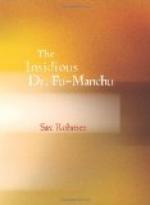“A dead Chinaman!”
“A dead Chinaman.”
“Doctor seen them?” rapped Smith.
“Yes; a local man. He was out of his depth,
I could see.
Contradicted himself three times. But there’s
no need for
another opinion—until we get the coroner’s.”
“And Croxted?”
“Croxted was taken ill, Mr. Smith, and had to be sent home in a cab.”
“What ails him?”
Detective-Inspector Weymouth raised his eyebrows and carefully knocked the ash from his cigar.
“He held out until I came, gave me the story, and then fainted right away. He said that something in the conservatory seemed to get him by the throat.”
“Did he mean that literally?”
“I couldn’t say. We had to send the girl home, too, of course.”
Nayland Smith was pulling thoughtfully at the lobe of his left ear.
“Got any theory?” he jerked.
Weymouth shrugged his shoulders.
“Not one that includes the green mist,”
he said.
“Shall we go in now?”
We crossed the Assyrian hall, where the members of that strange household were gathered in a panic-stricken group. They numbered four. Two of them were negroes, and two Easterns of some kind. I missed the Chinaman, Kwee, of whom Smith had spoken, and the Italian secretary; and from the way in which my friend peered about the shadows of the hall I divined that he, too, wondered at their absence. We entered Sir Lionel’s study—an apartment which I despair of describing.
Nayland Smith’s words, “an earthquake at Sotheby’s auction-rooms,” leaped to my mind at once; for the place was simply stacked with curious litter—loot of Africa, Mexico and Persia. In a clearing by the hearth a gas stove stood upon a packing-case, and about it lay a number of utensils for camp cookery. The odor of rotting vegetation, mingled with the insistent perfume of the strange night-blooming flowers, was borne in through the open window.
In the center of the floor, beside an overturned sarcophagus, lay a figure in a neutral-colored dressing-gown, face downwards, and arms thrust forward and over the side of the ancient Egyptian mummy case.
My friend advanced and knelt beside the dead man.
“Good God!”
Smith sprang upright and turned with an extraordinary expression to Inspector Weymouth.
“You do not know Sir Lionel Barton by sight?” he rapped.
“No,” began Weymouth, “but—”
“This is not Sir Lionel. This is Strozza, the secretary.”
“What!” shouted Weymouth.
“Where is the other—the Chinaman—quick!” cried Smith.
“I have had him left where he was found—on the conservatory steps,” said the Inspector.
Smith ran across the room to where, beyond the open door, a glimpse might be obtained of stacked-up curiosities. Holding back the curtain to allow more light to penetrate, he bent forward over a crumpled-up figure which lay upon the steps below.




